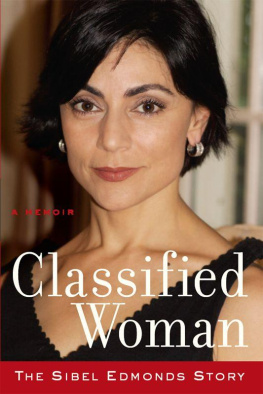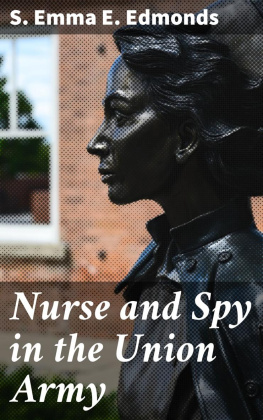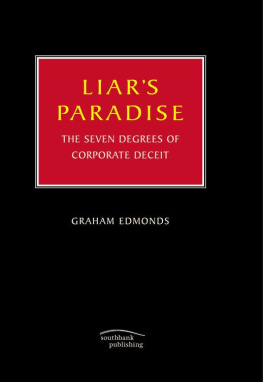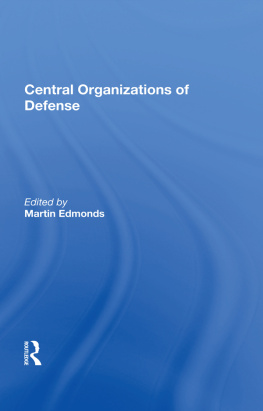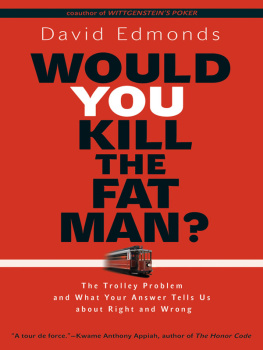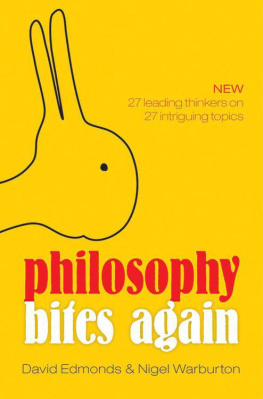Copyright 2012 by Sibel Edmonds
All rights reserved.
Published by Sibel Edmonds, Alexandria, Virginia
ISBN-13: 978-0615602226
ISBN-10: 0615602223
eBook ISBN: 978-1-62110-021-8
On Sibel Edmonds
We have been doing national security litigation for more than 30 years, and in our view, this is the most egregious misuse of the classification authority weve seen.
Michael Kirkpatrick, Washington Times
Having lived under tyranny in Iran and elsewhere, Edmonds knows what it looks like. In her case, and in many other recent cases, tyranny comes in the form of the state secrets privilege, a foolproof mechanism of the federal government to hide executive branch corruption, incompetence, and illegal activity. This is a practice more at home with czars and nabobs, and should have no place in the United States. But Edmonds gave the government something it never expecteda no-holds-barred battle. She hoisted the black flag and went on the attack by forming the National Security Whistleblowers Coalition, an organization dedicated to changing the law, exposing government misdeeds, and giving hell to those who richly deserve it.
Professor William Weaver, University of Texas
Shes a First Amendment cannonball. She speaks up for what she believes in. Shes a leader. The fact that she, not only, was a strong advocate for her own case, but she became a strong advocate for the public policy, for the greater good.
Congresswoman Carolyn Maloney (D-New York)
She had the intuition, the courage, and the backbone to stand up and do it. And we are very grateful to her. And the PEN Award is significant in that regard. Tell the public what happenedSibel Edmonds was a heroine in this.
Senator Frank Lautenberg (D-New Jersey)
Sibel Edmonds is certainly one of my heroes and Im glad to have heard of her effort. I admire what she is doing very much. I think shes serving the country very well.
Daniel Ellsberg, Democracy Now
Sibel Edmonds Kafkaesque ordeal underscores how easily government powers, especially powers wielded in the name of national security, can be abused to keep the public in the dark about official failings. PEN is deeply troubled by Sibel Edmonds story and by the growing number of reports of efforts by the administration to silence government employees.
Larry Siems, PEN American Center
Sibel Edmonds is an American Patriot. She has a classic story to tellwhich is the story of an immigrant, who came here seeking more freedom, and seeking a real democracyand was unfortunately shut down when she tried to exercise her rights under the First Amendment.
Ann Beeson, American Civil Liberties Union
For nearly a decade, Sibel Edmonds has fought against excessive government secrecy, built up an organization of more than one hundred national security whistleblowers, and exposed government attempts to cover up abuses.
James Bamford, bestselling author and award-winning journalist
The silencing of Edmonds has been remarkably silent. Which is probably just what the FBI was counting on in the first place.
Clay Risen, The New Republic
To Ela & F.R. Deniz
Contents
S ome say life is a journey. I agree. My life has been three major journeys, each marked by a distinctive set of events that defined and shaped who and where I am today.
The first journey of my life took me to Iran. It was marked by witnessing my father subjected to arrest, interrogation and, of course, torture, a common practice in the reign of Shah Reza Pahlavi, Irans king. My fathera doctor, a surgeonbelieved in democracy and liberal values; he advocated collective bargaining for the working class to achieve health care benefits and wages that would enable them to survive. For this he was marked as a Communist and imprisoned. For doing right by others he was tortured. In spite of it all, and against ardent protestations of his family, he continued to fight for his countrys freedoms; to help where he could, to ease suffering. His were deeply held beliefs. His journey became mine, at a very early age. We were bonded.
That first journey too was marked by revolution: I watched it unfold and witnessed oppression, persecution, and merciless injustice. Overnight, fundamental values were forced on me: how I should be dressed, how I should cover every strand of hair, how precisely and how many times I must pray. I had no choice in the matter of where I lived; we dont get to choose where we are born or taken by our parents. While this bumpy road ended as tumultuously as it started, I carry its scars with me. They are permanent. My disdain for any form of religious fundamentalism, aversion to even the word monarchy , and hatred for any despotic practice, all were acquired during this time and will stay with me forever.
The second journey began on my return to Turkey. This one was marked by censorship: my fellow Turks and I were forced to swallow words and black out any sentence forbidden by those who ruled. Punishment for violators was cruel and severe, as happened to many authors and reporters I admired: all of them locked up for expressing opinions that many shared but few dared even to acknowledge. Here it was in black and white: when freedom of the press and expression are taken away, the suffering and ill consequences are not limited to only those few who write and report. All of my fathers resolve, for instance, all his hard work and support, were not adequate to prevent censorship from affecting what I was taught in school, what I yearned to learn and what I longed to express. These were forbidden.
The iron force of the Turkish state marked my second journey with its mass killing of its minorities, mass detention of its dissidents, and mass corruption among its ruling parties. This journey too was one by default; I played no role in starting it. I did, however, conclude it by making the decision to leave it behind and choosing the next path myself. These experiences too, for as long as I live, are engraved in my conscience and soul. My passionate love for freedom of speech and of the press, my dedication to the protection of due process, and my endless quest for government held accountablegained in the void of their absencealways will remain an inseparable part of me.
The most important of my three journeys is the third. This is the one chosen freely: coming to the United States of America. This journey started as love at first sight. Its beginning was marked by living with the kind of freedom and rights that had existed only in books and my fantasies. This road became a highway as I began to know the Constitution my new country theoretically upheld, the separation of powers it said it exercised, and a fairly new concept of equality it tried to nurture. I chose this country, and I wanted to immerse myself in its culture; to meld with it, blend into it; become inseparable, so that all those things I admired and longed for would apply to me; would envelop me. I rushed through its steps until I reached the top, where I would declare my oath to my newfound land, and dedicate myself not only to cherish but also to protect it for as long as I chose to live in it. The strength and fidelity of this union didnt lessen over time. Each passing year, of education in its laws and history, of visits to any of the diverse cultures it contained, left a lovely mark in me to hold on to, show, and treasure.
Until, that is, the chosen road changed shape and took me in a blind direction, leading me into dark, cold places I never thought existed. Just like the dark side of the moon, here was the dark side of my precious third journeya side not many talked of or wrote about; an ugly side that may have shown up here and there, once in a while, throughout its history, like a childs bad monster popping up in the night, then retreating into shadows, never lingering long enough to be seen or figured out, or ever exposed in the light.

